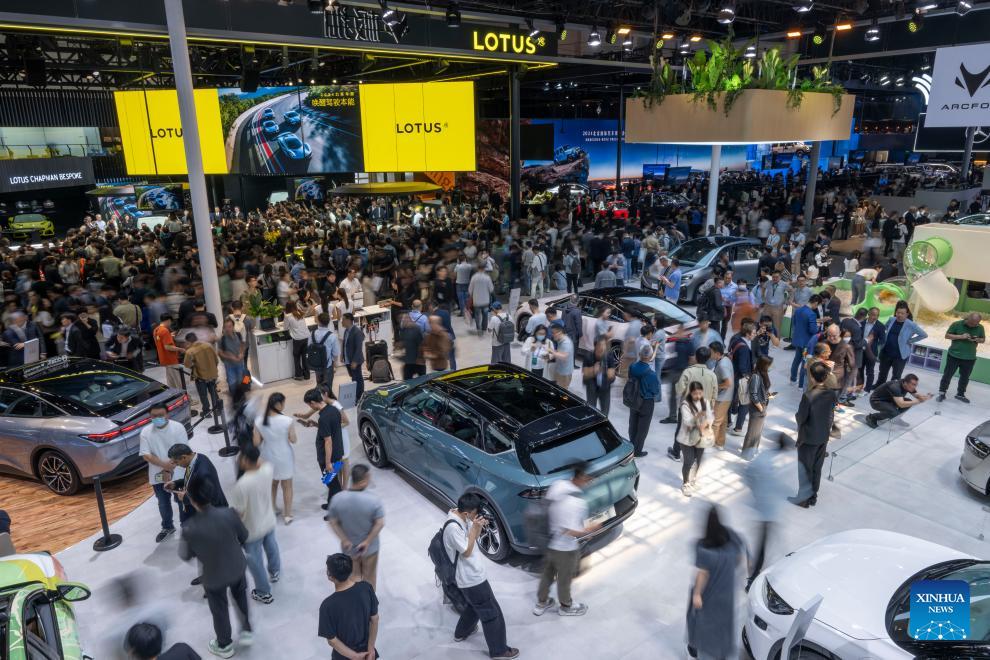
 0 Comment(s)
0 Comment(s) Print
Print E-mail Xinhua, April 28, 2024
E-mail Xinhua, April 28, 2024

People visit the 2024 Beijing International Automotive Exhibition in Shunyi District, Beijing, capital of China, April 25, 2024. [Photo/Xinhua]
The 2024 Beijing International Automotive Exhibition, an A-list event continuing through May 4, is showcasing an unprecedented number of new energy vehicles (NEVs), with 278 distinct NEV models on display, reflecting the growing dominance of NEVs in the auto industry.
CATL, a leading battery manufacturer, launched a new battery at the prestigious auto show, featuring a world-first innovation that offers a 1,000-km range and supports ultra-fast charging.
This breakthrough allows for a 600-km range in just 10 minutes of charging, achieving a recharge rate of "1 kilometer per second."
A CATL spokesperson said that while the world is turning climate consensus into action, many obstacles remain. Technological inequality persists, and some countries are slowing the pace of the green energy transition, which creates challenges in advancing a sustainable future for the world.
"Today, we need to unite as never before to tackle these pressing challenges, and I believe an open approach to innovation is the solution," the spokesperson told Xinhua.
In China, the new energy passenger car retail penetration rate exceeded 50 percent for the first time in the first half of April, indicating that one out of every two cars sold is a new energy vehicle. This milestone is particularly significant, considering China's ambitious goal set in 2020 to exceed a 50 percent NEV penetration rate by 2035, which seemed distant at the time when the penetration rate was only 5.8 percent.
As sustainable development deepens, the global demand for new energy products, services, and technologies has grown significantly, according to a new KPMG report on Chinese new energy enterprises "going global."
China plays a crucial role in promoting global green and low-carbon development. Its new energy industry has not only achieved remarkable success in the domestic market but is also actively expanding into the international market, enhancing the energy industry's level of internationalization, as noted in the report.
"This contributes Chinese wisdom and solutions to the realization of global green development goals."
Riding China's tailwinds
Timur Gul, chief energy technology officer of the International Energy Agency (IEA), said carbon dioxide emissions from the transportation sector account for over one-fifth of the global total emissions and are a major source of pollution in urban areas.
The good news is that even under the current policy environment, oil consumption in the transportation sector will reach its peak within this decade, and the key driver of this transition is the electrification of road transport, according to Gul.
He stated that the robust growth of the electric vehicle (EV) market is pivotal for reaching global climate objectives. He highlighted that for governments worldwide, the EV market presents escalating opportunities. These extend beyond climate improvement and air pollution reduction to encompass economic growth and the fulfillment of industrial targets.
Aion, an EV brand under China's Guangzhou Automobile Group (GAC), has become one of the fastest-growing automotive brands globally. This success is attributed to its comprehensive in-house research and development in the domains of EVs and intelligent connected vehicles (ICVs).
GAC Aion General Manager Gu Huinan emphasized the company's commitment to bringing high-quality, intelligent and valuable products to the local markets and driving local automotive industry development.
In 2022, Aion's smart eco-factory achieved zero carbon emissions and was honored as the Global Lighthouse Network's (GLN) sole NEV manufacturer member in December 2023.
The GLN was formed when the World Economic Forum (WEF) teamed up with McKinsey & Company in 2018 to identify the most innovative leaders in manufacturing. The WEF introduces the GLN as a globally recognized community transforming factory and value chain operations with Fourth Industrial Revolution technologies, with each member indisputably a leader in its respective industry.
Gu told Xinhua that Aion's global leadership in intelligence and digitalization can serve as a model for local manufacturing.
The robust tailwinds created by China's NEV industry are not only propelling domestic growth but also turbo-charging innovation and opportunity across the global automotive landscape.
David Slump, President and CEO of Marelli, a leading global automotive supplier, highlighted the importance of "China speed" for innovation.
"If you look at our order book, about 25 percent of orders are from China," he told Xinhua at the auto show. "That tells me that we'll be growing faster in China than elsewhere, and that's super important. And it's because of the speed and the innovation in China."
With 5,000 employees in China, including 800 engineers, Marelli looks forward to expanding its R&D presence in this competitive market.
"What are we focused on? Speed. China speed. That's super important for innovation," Slump confirmed Marelli's long-term commitment to China. "We asked ourselves, what's the 'next China'? And the answer is China."